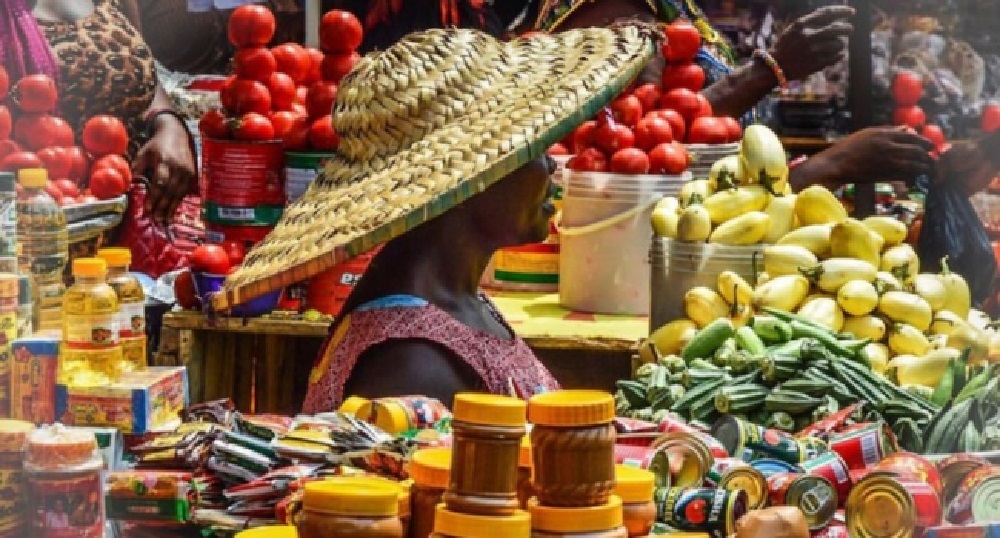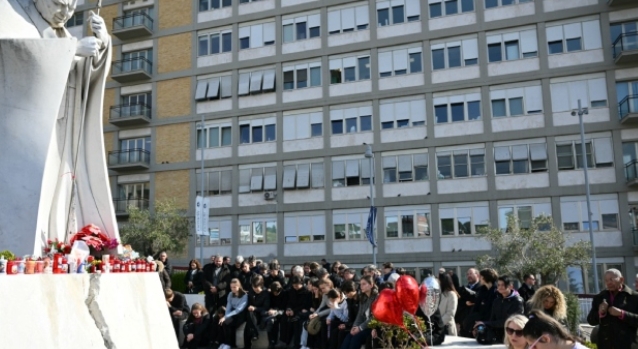News
Food inflation: We weep each time we go to market, housewives lament

Prices of food items have continued to soar in the market causing Nigerian housewives’ serious heartache.
The skyrocketing food prices in Nigeria have made many housewives and mothers ‘mathematicians’ as they constantly struggle to manage the resources available to meet family needs amid increasing prices and declining purchasing power.
“I’m always agitated anytime I remember that I have to go to the market because of the surging food prices. Things are very expensive in the market and the cost of making a pot of soup has more than tripled in the last year,” said Chidinma Kalu, a Lagos-based housewife.
Catherine Ako, a civil servant said that husbands are not passing through half of what their wives are passing through nowadays because men only give their wives money, and the women will go to the market to find out that what they have would be enough only for them to add their money to make up.
“The cost of protein is very high with meat, fish, stock fish, egg, chicken and turkey gradually going out of the reach of the poor. I spend almost 85 percent of the family feeding allowance on buying protein to cook soup, stew and other meals.
“To prepare a pot of soup for my family of eight, I have to buy meat of about N9,000, frozen fish of N10,000 and stock fish of N4,000, totalling N23,000 for protein alone. This is aside from other ingredients that are needed to make soup, which would take nothing less than N7,000. This means that every week that I make soup for my family, I spend nothing less than N30,000 but this time last year, it only cost about N10,000,” said Kalu, the mother of four.
According to her, “I always feel like crying each time am coming back from the market. I feel robbed. With a lot of money, you hardly get something to fill a nylon back. It is crazy right now in Nigeria.”
Comparing how prices have changed in the last year, Funmi Adewunmi, a nurse, said her family’s weekly feeding bill has increased from N30,000 to over N50,000.
According to the mother of two, her family of four manages to make do with N100,000 weekly expenditure on feeding alone at a time salary is not increasing.
“Since Tinubu’s administration, all we do with our salaries is to eat food without being able to do any other thing. It is now difficult for families to feed well and save money to pay other bills. We only eat food and struggle to pay children’s school fees, house rent and meet other needs,” said Adewunmi.
She said that families hardly talk about saving for investment in today’s Nigeria.
“I nearly fainted when a yam seller told me that a tuber of new yam sells for N11,000. Both old and new yam are no longer reachable to the poor. Beans and maize are also expensive, meaning that there is no more ‘poor man food’ in Nigeria because every food item is expensive,” said Efe Esosa, a Benin-based fashion designer.
She said she bought 5kg of Semovita for almost N9,000 last week and that ate into the money that she was supposed to cook soup and stew for the weekend.
The fashion designer said that the only saving grace for her family in recent times is the cooperative society where she belongs where a group of women come together to make weekly contributions.
“I contribute N5,000 every week and when is my turn to take home, I use the bulk money to stock the house. It is a bit cheaper to buy food items and even protein in bulk. This is why the rich are the ones who are buying food cheaper compared to the poor.
“The beauty of bulk buying is that it not only makes it cheaper to buy food but also takes some measure of stress off one’s shoulder. Food is expensive in Nigeria but buying it in a bit even worsens it,” Esosa said.
Franklin Godspower, a transporter told BusinessDay Sunday that he always feels for his wife who complains every time she goes to the market to buy food items for the house.
“I commend my wife because I don’t know how she manages the little money that I give her as a weekly feeding allowance. I didn’t know that things had gone this bad until last week when my wife was not feeling too well and I decided to help her buy ingredients for stew only to realise that N15,000 was not able to buy tomatoes, pepper, rice and chicken for stew. Since then, I gave kudos to Nigerian housewives,” said Godspower.
BusinessDay Sunday discovered that part of the reason why food prices are surging is the fact that middlemen and off-takers buy agricultural produce from farmers and hoard them to sell at expensive prices.
According to a dealer, who does not want his name in the print, off-takers go to farmers and buy agricultural produce in lands, when the farmers have not harvested.
The dealer said that middlemen in the supply chain contribute a great deal to the price surge. He cited an example with a basket of tomatoes that sold for as much as N140,000 in Lagos recently when off-takers were buying for as low as N40,000 or N50,000 in places like Jos, Plateau State.
He also claimed that insecurity in the northern parts of the country is also adding to a high of cost food items in Nigeria.
“Many farmers are no longer going to their farms due to insecurity and few farmers who are still going to the farm are forced to pay tolls to bandits to access their farms without any interference,” the dealer said.
He said that the high cost of logistics also plays a critical role in driving food costs to the extreme, especially with the removal of petroleum and forex subsidies by Tinubu’s administration.
Credit: BusinessDay
News
Worldwide Prayers For ‘Critically’ Sick Pope Francis

By Kayode Sanni-Arewa
Pope Francis spent his tenth day in hospital Sunday as Catholics around the world prayed for his recovery, the day after the Vatican warned the 88-year-old’s condition was “critical”.
The Argentine pontiff, who is being treated for double pneumonia, suffered a prolonged asthma-style attack on Saturday and required blood transfusions for a low platelet count.
On Sunday morning the Holy See said “the night passed peacefully, the pope rested” — indicating no repeat of the crisis the previous day, Vatican sources said.
But Francis, who had part of a lung removed when he was a young man, is still receiving oxygen through a tube in his nostrils in the papal suite at Rome’s Gemelli hospital.
In a message published Sunday but written in the past few days, the Jesuit thanked hospital staff and said he had confidence in his treatment.
“I am confidently continuing my hospitalisation at the Gemelli Hospital, carrying on with the necessary treatment — and rest is also part of the therapy!” he said.
“I ask you to pray for me,” he concluded in the text published in lieu of his weekly Sunday Angelus, which he normally delivers from a window overlooking St Peter’s Square.
People pray at the feet of a statue of John Paul II outside the Gemelli hospital where Pope Francis is hospitalized for pneumonia in Rome on February 23, 2025. (Photo by Alberto PIZZOLI / AFP)
Francis, who has been head of the Catholic Church since 2013, was admitted on February 14 initially with bronchitis, but his condition has deteriorated since then.
In its evening update Saturday, the Vatican warned his “condition continues to be critical, therefore the pope is not out of danger”.
It said Francis was alert and “spent the day in an armchair even if he was suffering more than” the day before.
It said he had a “prolonged asthmatic respiratory crisis, which also required the application of high-flow oxygen”.
Daily blood tests also “showed thrombocytopenia, associated with anaemia, which required the administration of blood transfusions”, it added.
Thrombocytopenia is a condition that occurs when the platelet count in the blood is too low, which can cause trouble stopping bleeding.
Blood or platelet transfusions, delivered via an intravenous (IV) line, are given to people who are either bleeding heavily or at very high risk of bleeding, according to the US National Institutes of Health (NIH).
“The pope gets worse,” headlined Italy’s Corriere della Sera newspaper on Sunday, while La Repubblica described it as the “darkest day” at the Vatican.
Well-wishers have been leaving candles outside the Gemelli since Francis was admitted, and a special mass was planned for Sunday evening in Rome.
“I am praying for him, for his health, because he is a special person for all of us,” Italian teacher Ilde Zito told AFP at the hospital.
Prayers and messages of solidarity also came in from among the almost 1.4 billion Catholics across the globe, alongside other Christians and world leaders.
In the cathedral of Buenos Aires, where Francis was once archbishop, TV screens at the entrance showed images of then Jorge Bergoglio’s good works, and the priest held a special mass.
“He is strong, he has always been strong, but there is nature. I know he is very ill and old. I hope he recovers, but it makes me sad,” Hector Armando Diaz, 76, a retired sales clerk, told AFP there.
Across the world in Iraq’s northern city of Mosul, a former bastion of the Islamic State group that Francis visited in 2021, at least a dozen churches also held prayers for him.
“This is the least we can do to express our solidarity, love, and appreciation for this great person,” said university professor Adnan Hadi.
Mexico’s president, Claudia Sheinbaum, offered her hopes on social media for a speedy recovery for the “great humanist” Francis, the first pope from the Americas.
Francis’s continued hospitalisation has sparked huge concern about his health but also speculation about whether he might step down.
He has always left the door open to following his predecessor, Benedict XVI, who in 2013 became the first pope since the Middle Ages to resign.
But he has repeatedly said it was not the time.

The pope maintains a punishing work schedule. He carried out a mammoth 12-day tour to the Asia-Pacific in September, but has suffered increasing health issues.
He underwent colon surgery in 2021 and an operation for a hernia two years later. He is overweight and has constant hip and knee pain, which forces him to use a wheelchair.
AFP
News
Liverpool thrash Man City, Go 11 Points Clear

By Kayode Sanni-Arewa
Liverpool took a big step to winning the Premier League, crushing an uninspiring Manchester City in a showdown on Sunday.
Mohamed Salah stole the show, scoring one and providing an assist to send Liverpool 11 points clear at the top of the table although they have played a game more.
The Egyptian opened the scoring with his 30th goal of the season before setting up Dominik Szoboszlai to double the lead before half-time.
Just days after exiting the Champions League to Real Madrid, this was another sobering defeat for the dethroned English champions, who are now 20 points adrift of the leaders.
So often during Pep Guardiola’s glorious reign, Liverpool have come up just short in English football’s great rivalry of recent years.
However, their time to match Manchester United’s record of 20 English top-flight titles now appears just months away in Arne Slot’s first season in charge.
Arsenal’s shock 1-0 home defeat to West Ham on Saturday had eased the pressure on Liverpool, that had built after dropping points in two of their last three games at Everton and Aston Villa.
A trip to the Etihad has for so long been the stiffest test of all, but City’s defensive frailties were easily exposed and they also badly missed the presence of the injured Erling Haaland in attack.
Liverpool, by contrast, had their talisman fit and firing as Salah took his staggering tally this season to 25 goals and 16 assists in 27 Premier League appearances.
However, their time to match Manchester United’s record of 20 English top-flight titles now appears just months away in Arne Slot’s first season in charge.
Arsenal’s shock 1-0 home defeat to West Ham on Saturday had eased the pressure on Liverpool, that had built after dropping points in two of their last three games at Everton and Aston Villa.
A trip to the Etihad has for so long been the stiffest test of all, but City’s defensive frailties were easily exposed and they also badly missed the presence of the injured Erling Haaland in attack.
Liverpool, by contrast, had their talisman fit and firing as Salah took his staggering tally this season to 25 goals and 16 assists in 27 Premier League appearances.
The Egyptian fired the visitors in front on 14 minutes thanks to a brilliantly executed set-piece routine.
Alexis Mac Allister’s corner was flicked by Szoboszlai into Salah’s path and his shot deflected off Nathan Ake past the despairing dive of Ederson.
At the other end, City’s own Egyptian international showed his ability to finish, but Omar Marmoush had strayed offside before being played in by Phil Foden.
City winger Jeremy Doku was skipping past Trent Alexander-Arnold at will, yet the Belgian consistently failed to deliver a telling cross or shot.
Salah was not so forgiving as he raced onto a long ball over the top and teed up Szoboszlai to wrong-foot Ederson.
The final outcome could have been much more humiliating for City had Liverpool had been as accurate on the counter-attack after the break.
Curtis Jones had a third goal ruled out by a VAR review for offside after Szoboszlai just failed to time his run through the heart of the City defence.
Ederson was forced into a stunning save from Luis Diaz and only a brilliant last-ditch tackle from Abdukodir Khusanov denied Szoboszlai a second.
Marmoush scored a hat-trick in last weekend’s 4-0 win over Newcastle and remained a lively threat as he flashed another effort across the front of Alisson Becker’s goal.
But City lacked the end product to make nearly 70 percent possession count.
Despite an eighth league defeat of the season, Guardiola’s men remain in fourth and will be confident of securing their place in the Champions League next season with a top-five finish likely to be enough.
However, after an unprecedented run of four consecutive titles, City look like yesterday’s team with Liverpool now champions in waiting.
News
Saudi Arabia donates 100 tonnes of dates to Nigeria as fasting approaches

By Kayode Sanni-Arewa
The Embassy of the Kingdom of Saudi Arabia in Abuja has held an official ceremony to distribute 100 tonnes (100,000kg) of dates to Nigeria as part of its annual humanitarian relief efforts.
The initiative, facilitated by the King Salman Humanitarian Aid and Relief Centre (KSrelief), aims to support vulnerable families across the country and strengthen the deep-rooted ties between the two nations.
During the ceremony, the Ambassador of the Custodian of the Two Holy Mosques to Nigeria, Faisal bin Ibrahim, conveyed the Kingdom’s dedication to humanitarian causes.
He expressed his profound gratitude to King Salman bin Abdulaziz and Crown Prince Mohammed bin Salman for their unwavering support in providing aid to Muslims and underserved communities worldwide.
He emphasised that Saudi Arabia remains steadfast in its commitment to fostering Islamic solidarity and providing relief to those in need.
Mr Al-Ghamdi explained that this year’s distribution includes 50 tonnes of dates for Abuja and another 50 tonnes for Kano, continuing Saudi Arabia’s tradition of assisting Nigeria through humanitarian donations.
He noted that the initiative represents the Kingdom’s broader mission to uplift Muslim communities, alleviate suffering, and promote unity, particularly during significant religious periods such as Ramadan.
The embassy, in collaboration with local authorities and humanitarian organisations, will ensure the proper distribution of the dates so that they reach the most vulnerable families in various regions of Nigeria
Saudi Arabia has been a longstanding partner in providing humanitarian aid to nations across the globe, including Nigeria. The Kingdom’s continued efforts in supporting food security and welfare initiatives exemplify its role as a global leader in charitable and humanitarian endeavours.
Through Vision 2030, Saudi Arabia seeks to expand its contributions to international humanitarian causes, reinforcing its dedication to fostering peace, stability, and prosperity worldwide. The ongoing provision of aid to Nigeria is a testament to these commitments and highlights the decades-long partnership between the two brotherly nations.
-

 Metro19 hours ago
Metro19 hours agoInsecurity! Gunmen invade church, slash pastor’s 2 fingers
-

 Metro19 hours ago
Metro19 hours agoFire engulfs MTN office in Oyo
-

 Foreign19 hours ago
Foreign19 hours agoPentagon set to sack 5400 staff as attack hits Trump’s downsizing plan
-

 Metro19 hours ago
Metro19 hours agoDanger averted as police rescued six kids from collapsed building
-

 Sports19 hours ago
Sports19 hours agoAtalanta coach makes a U-turn says he never knew his comment could offend Lookman
-

 News18 hours ago
News18 hours agoNSCDC, Tantita intensify joint efforts to combat oil theft in Niger Delta
-

 Sports19 hours ago
Sports19 hours agoEnd of road for Arsenal, may not win any shield this season – Report
-

 News13 hours ago
News13 hours agoThai lady arrested at Lagos airport with boxes of illicit drug consignments







